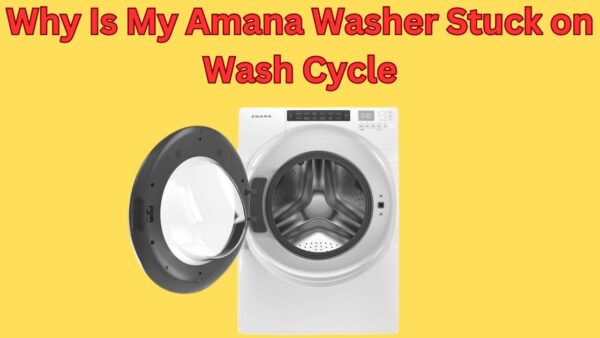Dishwasher uses about 4 gallons of water per cycle but still manages to clean better than handwashing? Yet, all that power means nothing if your Bosch dishwasher isn’t spraying water properly.
It’s like having a superhero with no superpowers—super frustrating! If you’ve stood in front of your dishwasher wondering, “What went wrong?”, you’re not alone.
There are plenty of reasons this might happen, from clogged spray arms to a faulty circulation pump.
Don’t worry, though—we’re here to unravel the mystery.
This guide will walk you through 15 common reasons for the problem and what you can do about it.
By the end, you’ll either have your dishwasher back to its sparkling glory or know exactly what to tell your repair technician for a swift solution.
Why Does My Dishwasher Run But Not Spray Water?
A dishwasher that runs but doesn’t spray water can be incredibly frustrating. This issue often happens when the spray arms are blocked by food debris or hard water buildup.
Low water pressure in your home can also prevent the spray arms from functioning properly. Another common reason is a broken circulation pump, which means water isn’t being directed to the spray arms.
If these components are damaged or not working, it may result in poor cleaning performance. Ensuring the spray arms and pump are maintained can prevent this issue from happening again.
How to Prevent:
Prevent debris from clogging your spray arms by regularly cleaning them with warm water and a soft brush. Avoid overloading the dishwasher, as improperly stacked dishes can block the spray arms.
Check your home’s water pressure regularly to make sure it’s strong enough for the dishwasher.
Clean the filters and inspect the circulation pump frequently to catch potential problems early. Make it a habit to use a dishwasher-safe cleaner to remove hard water buildup that could restrict water flow.
Why Is My Bosch Dishwasher Not Pulling Water?
If your Bosch dishwasher is not pulling water, the problem usually lies with the water inlet valve. This valve might be blocked or damaged, preventing the machine from filling properly.
A Bosch dishwasher not spraying water could also indicate that the float switch is stuck. When this switch becomes jammed, it stops the dishwasher from pulling water to prevent overflows.
Additionally, a clogged or kinked water supply hose can block the flow of water into the machine, resulting in a Bosch dishwasher not spraying water effectively.
How to Prevent:
Regularly inspect the water inlet valve for debris and clean it as needed. Make sure the float switch is moving freely by checking for any obstructions or dirt buildup. Ensure the water supply hose isn’t bent or pinched, as this can restrict water flow.
Use a water filter to minimize mineral deposits that may block the valve or hose.
Prevent your Bosch dishwasher not spraying water by scheduling routine maintenance checks to keep each part functioning efficiently.
Why is My Bosch Dishwasher Sprayer Not Working?

1. Clogged Spray Arms
Cause:
Food debris often builds up in spray arm openings, blocking the water flow. Over time, grease and soap scum can make the problem worse. Reduced pressure results in the Bosch dishwasher not spraying water. The sprayers may rotate unevenly or fail to spin at all. This is one of the most common reasons for poor cleaning results.
Prevention:
Remove the spray arms and clean them regularly with warm soapy water. Use a toothpick or small brush to clear any blocked holes. Run a monthly dishwasher cleaner to reduce grease buildup. Scrape food off plates before loading dishes. Ensuring the arms are clean will keep water spraying at full force.
2. Faulty Water Inlet Valve
Cause:
The water inlet valve helps regulate water entering the dishwasher. If it’s clogged or broken, your Bosch dishwasher might not be spraying water properly.
A damaged valve reduces the amount of water reaching the sprayers. This can slow cycles and leave dishes dirty. Mineral buildup is a frequent cause of inlet valve malfunctions.
Prevention:
Check and clean the water inlet valve every 6 months. Replace the valve if you notice signs of wear or irregular water flow. Install a water softener to prevent mineral buildup. Avoid using very hot water that might crack the valve seals. Regular inspection ensures steady water flow.
3. Low Water Pressure
Cause:
Dishwashers require strong water pressure, and when it’s too low, sprayers won’t function. This can occur due to home plumbing issues or a failing pump. Low water pressure leads to uneven cleaning performance. With insufficient flow, the Bosch dishwasher not spraying water becomes a recurring problem. Pressure problems may also strain the system over time.
Prevention:
Test your home’s water pressure and maintain it within the dishwasher’s recommended range. Clean clogged pipes or replace them if necessary. If a pump within the dishwasher is at fault, consider replacing it. Regular plumbing checkups prevent water pressure drops. Keeping water pressure constant ensures optimal dishwasher function.
4. Dirty Filters
Cause:
Filters trap food particles, but a clogged filter can restrict water flow. When the filters are blocked, the Bosch dishwasher not spraying water is often the result. Overfilled filters may also cause water to back up inside the machine.
Poor filtration leads to unclean cycles and unpleasant odors. A neglected filter can even damage the pump.
Prevention:
Empty and wash the filters weekly with warm water. Remove any trapped particles to improve water circulation. Check filter placement to ensure they are correctly positioned after cleaning. Replace worn or damaged filters immediately. Consistent cleaning keeps your dishwasher working smoothly.
5. Blocked Hoses
Cause:
The water supply and drain hoses can clog with grease or debris. This restricts flow, preventing water from reaching the sprayer. When hoses are blocked, your Bosch dishwasher might not spray water effectively.
Worn or kinked hoses can also contribute to the issue. Hoses often require both regular cleaning and inspection.
Prevention:
Detach and clean the hoses every few months. Flush them with warm water to remove blockages. Check for wear or cracks, and replace damaged hoses promptly. Avoid overloading your dishwasher, which can push food into the hoses. Clean hoses ensure proper water movement inside the machine.
6. Broken Motor
Cause:
The motor powers the spray arms, so a broken motor will stop them entirely. Electrical faults or worn-out parts often cause motor failure. Without the motor, water will stay stagnant, leading to a Bosch dishwasher not spraying water.
Signs of motor failure include loud noises or cycles that take too long. Neglecting motor issues can halt dishwasher function.
Prevention:
Schedule maintenance checks on your dishwasher motor yearly. Ensure electrical connections are secure to avoid issues. Replace failing motors before they fully stop working. Keep debris away from the motor area to prevent damage. A functioning motor keeps spray performance consistent.
7. Faulty Pump
Cause:
The pump directs water through the spray arms, so a faulty pump disrupts water flow. If the pump becomes clogged or damaged, the Bosch dishwasher not spraying water is a likely symptom.
Weak pump performance limits water pressure during cycles. A damaged impeller inside the pump can worsen the problem. Pumps can wear down over time due to high stress.
Prevention:
Regularly check and clean the pump to remove debris. Inspect the impeller for signs of damage and replace if needed. Avoid running the dishwasher with heavy food leftovers to protect the pump.
Keep the pump compartment free of buildup. Proper maintenance prolongs pump lifespan and performance.
8. Malfunctioning Spray Arm Bearings
Cause:
Spray arm bearings aid rotation, and if they break or get stuck, the sprayers will stop moving. With no rotation, water might not reach all areas, leading to poor cleaning. This is another common reason why Bosch dishwasher not spraying water issues occur.
Bearings can wear out through normal use over time. A locked bearing makes sprayers ineffective.
Prevention:
Lubricate the spray arm bearings periodically with a food-safe lubricant. Check for cracks or wear and replace faulty bearings immediately. Clean debris around the bearing area to allow smooth rotation.
Avoid overloading the dishwasher, which can strain the bearings. Regular checks ensure spray arms rotate freely.
9. Improper Loading
Cause:
Overpacking your dishwasher blocks the spray arms, preventing water from reaching dishes. Objects too close to the sprayers can also obstruct flow. Improper arrangement may even cause your Bosch dishwasher to not spray water efficiently.
It’s a lesser-known yet frequent issue. Loading dishes haphazardly can also damage sprayers.
Prevention:
Leave enough space between dishes for water to circulate. Keep large items like trays or pans away from the spray arms. Load cups and bowls upside down to avoid blocking water flow. Consult the owner’s manual for proper loading tips.
A balanced load ensures water reaches all dishes.
10. Mineral Buildup
Cause:
Hard water leaves mineral deposits in hoses, valves, and spray arms. Over time, this reduces water flow and pressure within the dishwasher. Mineral buildup is a major reason why Bosch dishwashers stop spraying water effectively.
Stiff sprayers or blocked spray holes might indicate this problem. Calcium and lime deposits often accumulate silently.
Prevention:
Use a water softener to reduce mineral buildup. Run a descaling solution through the dishwasher monthly. Regularly clean the sprayers to remove lime deposits before they harden. Check hoses and valves for signs of scaling and clean them as needed. Preventing buildup keeps your dishwasher working smoothly.
11. Damaged Spray Arm Seals
Cause:
Spray arm seals keep water pressurized as it flows through the arms. If these seals are worn or cracked, they cause leaks and lower water pressure. This could result in a Bosch dishwasher not spraying water as expected.
Over time, these seals can dry out or degrade due to repeated exposure to heat and moisture.
A damaged seal might also interfere with the rotation of the spray arms.
Prevention:
Inspect spray arm seals for signs of deterioration during regular maintenance. Replace damaged or worn seals promptly to prevent further issues.
Avoid using overly hot cycles excessively, as extreme heat can speed up seal wear.
Clean seals gently to avoid causing unnecessary damage. Regular care ensures the seals stay intact and maintain water pressure.
12. Improper Dishwasher Leveling
Cause:
A dishwasher that isn’t level may cause water to pool irregularly, affecting the sprayers. When off-balance, the appliance struggles to distribute water evenly, contributing to the Bosch dishwasher not spraying water.
Poor leveling can also strain the motor and other internal components over time.
This issue often arises during installation or after moving the dishwasher. An unbalanced machine can also lead to water leaking from the unit.
Prevention:
Ensure the dishwasher is properly leveled during installation or after any adjustments. Use a spirit level to check and adjust the appliance’s feet as needed. Avoid placing heavy items on the door, as this can misalign the balance.
Securely place the dishwasher in its designated space to prevent shifts. Keeping it level helps water circulate effectively during cycles.
13. Faulty Control Board
Cause:
The control board is the brain of your dishwasher, managing all its functions, including water spraying. If it’s damaged or malfunctioning, sprayers might not receive proper instructions to operate.
This is often why a Bosch dishwasher is not spraying water or completing cycles. Electrical issues, like power surges, can affect the control board’s performance. Signs of failure may include unresponsive buttons or irregular cycle behavior.
Prevention:
Protect the dishwasher with a surge protector to prevent electrical damage. Avoid overloading the dishwasher or bosch washing machine won’t start beeps twice or starting multiple cycles, which can strain the control board.
If irregular behavior is detected, consult a technician to service or replace the control board. Keep the area around the dishwasher ventilated to prevent overheating of internal components.
Regular checks ensure the control board remains in working order.
14. Blocked Drain System
Cause:
If the drain system becomes blocked, standing water may prevent the sprayers from working correctly. Food particles, grease, and soap residue are common culprits clogging the drain system.
This blockage can lead to poor water circulation, resulting in the Bosch dishwasher not spraying water. Additionally, a partially clogged drain can create unpleasant odors over time.
Excess debris in the drain system may also interfere with pump operation.
Prevention:
Clean the dishwasher’s drain system monthly to remove any buildup. Run a mixture of baking soda and vinegar through the drain to loosen grime. Check the drain pump and filter for debris regularly, and remove trapped particles.
Ensure large food scraps are rinsed off dishes before loading them.
A clear drain system supports proper water flow and effective spraying.
15. Aging Dishwasher Components
Cause:
Over time, wear and tear affect various parts of the dishwasher, from the sprayers to the water pump. Old or worn components lead to decreased performance and a Bosch dishwasher not spraying water effectively.
Commonly affected parts include seals, hoses, and bearings.
Failure to address these aging issues can result in frequent breakdowns. Neglecting aging parts may eventually shorten the appliance’s lifespan.
Prevention:
Schedule periodic service checks for older dishwashers to identify worn components early. Replace aging parts before they fail completely to maintain optimal performance.
Use the dishwasher as per the manufacturer’s guidelines to minimize wear and tear. Avoid overloading the appliance, as it puts extra strain on older parts.
Regular maintenance keeps the dishwasher running efficiently for years to come.
What Should I Do If My Bosch Dishwasher Keeps Turning On But Won’t Spray Water?
Experiencing issues with your Bosch dishwasher not spraying water can be frustrating, but tackling the problem step by step can help you get back on track.
Here are five practical steps to address the situation:
1. Check for Clogged Spray Arms
One of the first things to inspect is the spray arms. Food debris or hard-water buildup can block the holes, leading to your Bosch dishwasher not spraying water properly. Remove the spray arms and rinse them under warm water to clear out any blockages.
Use a small brush to clean each hole to ensure water can pass through efficiently.
After cleaning, reattach the arms and run a cycle to see if the issue is resolved.
2. Inspect the Water Supply Line
If your Bosch dishwasher has no water or the water flow seems insufficient, check the water supply line. A kinked or clogged water hose may prevent proper filling.
Disconnect the hose, examine it for blockages, and clean or replace if needed. This step can address several issues, like the Bosch dishwasher not getting water or other water-related problems.
Ensure the hose is securely connected when reattaching.
3. Examine the Circulation Pump
A faulty circulation pump could explain your Bosch dishwasher not working as it should. If the pump isn’t directing water to the spray arms, dishes will remain dirty after the cycle ends.
Look for signs like unusual grinding noises or no water being sprayed. Replacing the Bosch dishwasher circulation pump might be necessary, which may require professional assistance.
Always consult your manual for guidance on handling pump-related issues.
4. Troubleshoot Electrical Component
Sometimes, the problem is related to electrical parts such as sensors or switches. The Bosch dishwasher salt sensor or float switch might be malfunctioning, impacting water levels.
Look at error codes or lights, like a Bosch dishwasher blinking red light, to diagnose the problem. If my Bosch dishwasher won’t start or its lights are unresponsive, this could indicate an electrical fault.
Reset the dishwasher or call a technician if repairs are beyond your comfort zone.
5. Run a Cleaning Cycle
Lastly, try running a Bosch dishwasher cleaning cycle with a dishwasher-safe cleaner. This can help clear out lingering debris or scale that could be reducing efficiency. Regular maintenance like this is essential to avoid Bosch dishwasher not cleaning properly over time.
If your Bosch silence plus 44 dba parts are still dirty after this process, they may need replacement.
A well-maintained dishwasher performs better and significantly reduces recurring issues.
Conclusion
To wrap things up, fixing a Bosch dishwasher that isn’t spraying water involves checking a few important parts, especially the pump impeller.
Over time, wear and tear on these parts can really impact how well your dishwasher works.
By keeping up with maintenance and replacing parts like the pump impeller when needed, you can extend your dishwasher’s life. Repairs can be tricky, so getting help from a professional might be a good idea. Bosch dishwasher blinking red light
With proper care, your Bosch dishwasher can keep cleaning effectively and remain a dependable part of your kitchen for years.

Name: Joseph Title: Owner and Founder Website: myappliancegeek.com
Biographical Info:
Joseph, the creative mind and founder behind myappliancegeek.com is a distinguished expert in the field of home appliances and technology.
Education: Joseph holds a prestigious degree in Appliance Engineering from a renowned institution in the United States, [Stanford University], where he gained a profound understanding of appliance design, mechanics, and technology.
Professional Experience: Joseph’s professional journey spans over [18 ] years in the home appliance industry. His extensive experience includes working with industry-leading appliance manufacturers, prominent retailers, and appliance repair services.
Entrepreneurship: In [2000], Joseph founded myappliancegeek.com, a platform dedicated to providing comprehensive information, advice, and solutions for those seeking guidance in the world of appliances.
Passion for Appliances: Joseph’s unwavering passion for home appliances stems from his belief in their pivotal role in improving our quality of life.
Contributions to the Industry: Joseph’s commitment to the home appliance industry is evident through his extensive writing and speaking engagements.
Community Involvement: Joseph is not only an online presence but also an active member of the community, frequently engaging in outreach programs, local workshops, and charitable initiatives.


